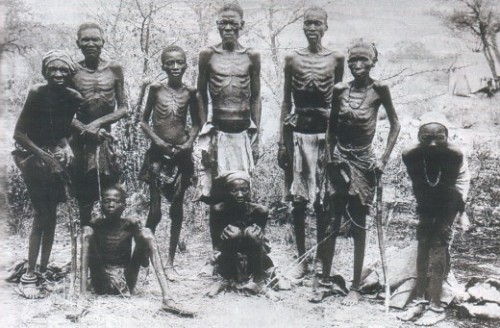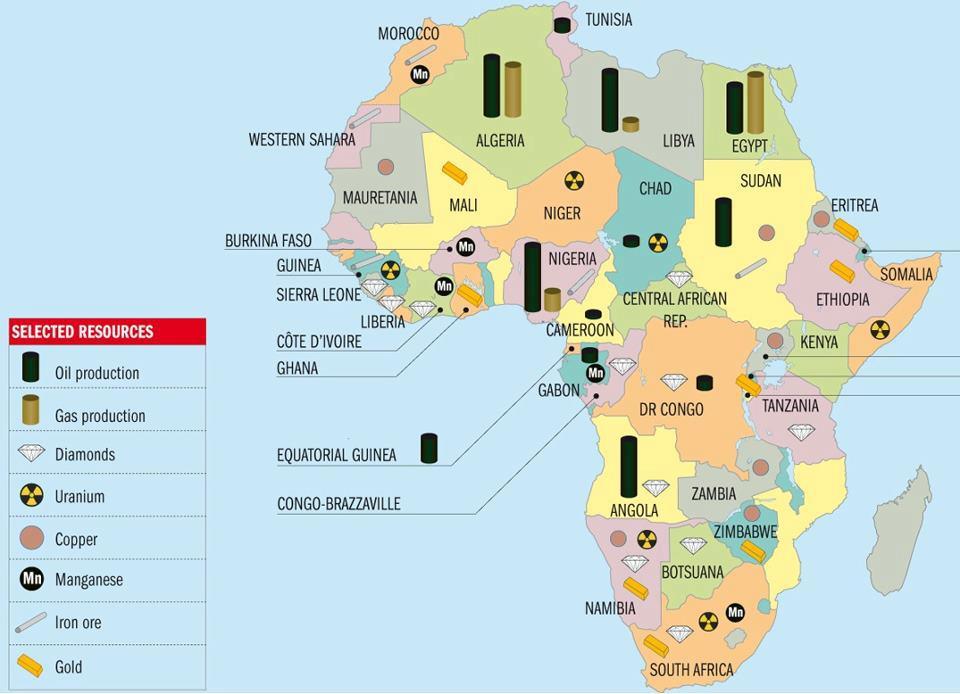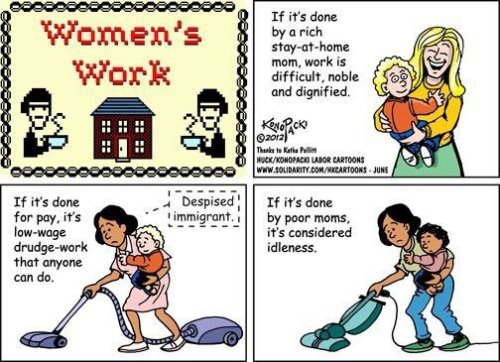What About the Men? Why Our Gender System Sucks for Men, TooBy Ozy Frantz and Noah Brand, The Good Men Project
Posted on July 11, 2012http://www.alternet.org/story/156194/wh ... men%2C_tooThis article is from a book in progress by Noah Brand and Ozy Frantz.If you are anything like us, you spent some time when you were younger playing with optical illusions: the vase that, if you looked at it differently, was two faces; the fish that were also birds; the old woman who was also a young lady.
If you were reading this in a book in a bookstore, and some malicious person had not moved it into the Local Birdwatching category, it would almost certainly be next to some other books about gender. (Yes, this is related.) Look at the other books, and you’d find they have one thing in common—they’re almost all about women. Women and work. Women and body image. Women and race. Women and sex. Women and feminism.
You’d think that only women have a gender.
For a long time, we’ve only been able to see half the illusion—we see the birds, but not the fish; the vases, but not the faces. We’ve noticed the thousands of ways, big and small, that our current gender system wounds women. Rarely, however, and often only as an afterthought does anyone remark on how the current gender system harms men.
♦◊♦
We live in a sexist society, one where gender programming starts at birth (though the advent of the sonogram has allowed parents to get a head start by painting the nursery pink or blue and stocking up in advance on gendered toys and clothes) and is so pervasive as to be inescapable. Feminism has done an excellent job analyzing and challenging the ways that these assigned and enforced gender roles damage and deform the lives of women. The same tools of analysis can be applied to the damage and deformation that men suffer. And that damage, sad to say, is severe.
The general term for the incredibly restrictive social codes on male behavior is hegemonic masculinity, though Paul Kivel refers to it as the “Man Box” in his work, and Charlie Glickman clarifies that to the “Act Like a Man Box” to emphasize the performative nature of the restrictions. We choose to use hegemonic masculinity as our term because it is less likely than “Man Box” to be used in a trend piece about how it’s okay for men to own steamer trunks now.
Indeed, the current cultural trend of terms like bromance, guyliner, mancession, and so on -- “bromanteaus” as we call them -- just demonstrates the power of hegemonic masculinity. Anything that might potentially be seen as outside the narrow bounds of acceptable male behavior, such as having a close relationship, wearing makeup, or being out of work, must be given a special name to assure people that it really is masculine, it’s not outside the box in any way.
So what is the box? What are the bounds of hegemonic masculinity? The essence of it is that the things we think of as “manly,” the things a “real man” does or is, are a mess of unreasonable, contradictory and impossible expectations and assumptions. A real man is supposed to be attractive to women, but not do anything for a woman’s approval or attention. A real man is supposed to be stoic and emotionless, but is permitted to show anger. A real man is supposed to be tall and have a big penis, for heaven’s sake, and if your genetic dice didn’t shake out that way, you’d better perform the rest of the list even harder to make up for your supposed deficiency.
Men who do not fit the box of hegemonic masculinity get all kinds of stigmatized. For instance, consider men who want to help raise their children. Stay-at-home dads and men on the “mommy track” often face disapproval and the belief that they “laze around all day” or “aren’t real men.” In public, men are all too often patronized as “Mr. Mom” or treated as though it’s exceptional and startling that they want to spend time with their children; it’s depressingly common for men openly interested in childcare to be called pedophiles.
Social pressure has astonishing effects on people’s behavior: just ask any teenager who drove home drunk from a party. Many people find it so unthinkable that men might want to have traditionally feminine jobs such as nurses or teachers that they tend to promote men out of those jobs and into more traditionally masculine positions such as administration; this sounds like an advantage, but most people become nurses to take care of patients, not to deal with paperwork, and it’s based in misandric stereotypes around what men can do. The social pressure to conform to the man box can be internalized, sometimes with tragic effects: unemployment increases a man’s risk of suicide more than it does a woman’s, partially because of the association between masculinity and success.
Even if they don’t experience social pressure, the expectations that they should act in a certain way can disadvantage men who don’t act that way. Straight men are all too often expected to approach women, ask them out, and pay for the date—which causes disproportionate pain to men who are socially awkward, shy or just broke. Male virgins are more likely than their female counterparts to feel shame because of their virginity.
Ultimately, the most important concepts in hegemonic masculinity are “strong," “tough,” and “winner.” Each of these is code for a wealth of symbolism and subconcepts, so that “tough” implies both “stoically emotionless” and “does not seek medical attention.” “Strong” covers “supports his family financially” and “bench-presses more than his bodyweight,” among other things. “Winner” is the key to a Pandora’s box of competition and inadequacy, where the twin concepts of “loser” and “failure” lurk, waiting to consume men’s sense of self at the least excuse.
Even for men who conform to these demands, these ideals of masculinity can burden them. Take toughness, for instance—it’s good to be tough, right? Chuck Norris is tough. Wolverine is tough. Toughness lets you survive in this hard world, keeps you from being weak and vulnerable. That’s a good thing to encourage people to be, right?
Turns out, not so much.
The ideal of physical toughness kills people. Especially men. Except for sex work, the most male-dominated jobs are the most dangerous, from lumberjacks to firefighters to soldiers, men are more likely to be injured on the job and suffer an astonishing 92% of fatal occupational injuries. Historically and cross-culturally, men’s life expectancy is shorter than women’s; in the United States, men tend to live four years less than women. While some of the discrepancy may be biological, much of it is due to socialization: in fact, the level of patriarchy in a society is associated with lower life expectancy for men. Men are encouraged to “tough out” pain and not go to doctors unless they absolutely need to.
Emotional toughness can also cause men pain; if you can’t open up emotionally to another person, it makes it more difficult to have friends. The social support gap is large and growing—men tend to report having fewer close friends and being less connected to their communities than women. For far too many men, romantic relationships are the only acceptable venue for them to express their feelings (and even there, the idea that men hate emotional intimacy limits them). In fact, men tend to report more distress due to a strained romantic relationship, possibly because women are far more likely to have a group of friends to help with the social support. The nervously joking societal construct of “bromance” arises from the notion that having a close male friend is something weird enough that it needs its own name.
Then there’s rape. When was the last time you heard men mentioned as rape or molestation victims in any public discussion of such issues? Despite the fact that 1 in 6 men are subject to unwanted sexual activity before the age of 18, despite the fact that 1 in 4 rape survivors in America is male, far too many people still believe a man cannot be raped, especially by a woman: the myth that an erection is consent, instead of a biological function, remains strong. The Centers for Disease Control’s own statistics draw a line between “rape” and “being forced to penetrate someone.” Not to be rude to the CDC, but we have a word for sex that someone is forced to have against their will. It’s called rape.
Even in cases of boys as young as 13 who are raped by teachers or other authority figures, many people congratulate them or call them lucky. Try to imagine anyone saying that to a 13-year-old girl who was molested by her teacher, and you begin to see how deep the gender gulf is here. In fact, some male rape survivors never acknowledge, even to themselves, that what they endured was rape. Rape of men is endemic within the prison system, which is not treated as a human rights outrage, but as an appropriate subject for jokes. Some even speak glowingly of prison rape as the real deterrent to criminal activity. It’s amazing how many people are downright enthusiastic about their government running rape camps, so long as the victims are male.
The ideal of toughness also impacts male survivors of abuse. Many people believe that men cannot be abused, because they’re “stronger,” or that if a man is abused it’s proof that he’s a wimp or a weakling; many believe that men who were raped are responsible for and enjoyed their rapes. Many of the guides to recognizing abuse are gendered with a female survivor and a male perpetrator, rendering abuse of men invisible. Many shelters do not provide services to male survivors (although some female-only shelters will put male survivors up in hotels).
Most men will never end up in prison, a majority will never be raped or abused, but the same societal expectations that allow us to laugh off the rape and abuse of men give rise to a thousand smaller micro-aggressions, all the little ways in which men are made to feel horrible in a gendered way. It sounds strange to say that the same system tells men that they are grotesque and laughable for being masculine, and simultaneously pathetic and laughable for not being masculine enough, but bizarrely, that is the case.
Of course, a few men do manage to perform hegemonic masculinity quite well and even avoid most of the negative consequences of masculinity. They avoid the treacherous edges, they navigate the contradictions as best they can, they do everything they’re supposed to to stay inside the box. And what’s the prize? They get to live the rest of their lives inside a box, unable to make even the slightest move lest they fall out of it. These, we are told, are the winners.
The problem of gendered, sexist expectations of men is enormous, and deeply ingrained into the culture. How are we to even begin dismantling such profoundly entrenched and damaging ideas? By using the same skills and tools that have worked before.
♦◊♦
In many feminist spaces, most particularly on the Internet, it is difficult to establish a decent dialogue about women’s issues without various men intruding, insisting that circumcision rates in the U.S. must be addressed
instead of the issue of female genital mutilation in Africa, insisting that male rape victims must be discussed
instead of female rape victims. These persistent conversation-derailers have succeeded in making a bad name for themselves, and given rise to the “what about teh menz?” trope as a boilerplate dismissal of these tired distractions from the addressing of women’s issues that is the
raison d’être of most feminist communities.
There’s a problem with that, though. Once the dismissal is done and the conversation is dragged forcibly back onto the rails… what about the men?
Feminism tends to focus on women. The name’s a bit of a giveaway there. Many of the biggest feminist issues have been women’s issues: reproductive rights, discrimination against women in the workplace, derogatory stereotypes of women. These are all serious issues, and feminism has made great strides in addressing them. The historical abuses against women’s rights are too numerous to list here, but even a cursory glance at the history of feminism shows that a focus on the rights of women has been necessary, important, and successful.
Then, too, many feminists have done excellent work in dealing with men’s problems. Stronger rape laws and paternity leave are just two of the benefits men have received because of feminism, and many survivors and many families are better off for it. Shelters, counselors and hotlines for survivors of rape and abuse, usually established by feminists, almost always also provide support for male survivors, support that would not exist otherwise. Groundbreaking feminist theorists like Michael Kimmel and Shira Tarrant have focused on men’s issues in addition to women’s. However, this valuable work has just made the problem clearer by highlighting how much more needs to be done. Freedom is not a zero-sum game. Liberating men from restrictive gender roles and gendered oppression is intrinsically bound up with liberating women from the same things.
Many feminists respond to arguments along these lines by saying that men ought to start their own movement, that they don’t see what feminism has to do with any of it. Unfortunately, this is the latest manifestation of an issue that has long dogged feminism and held it back: the inclusion problem. Feminism started as a movement by and for straight white middle-class women, and there were struggles over the inclusion of people of color, poor people, sexual minorities, trans people and the disabled. Many of these struggles continue to this day, and they all have one thing in common: the side of “we wish you well, but that’s not our thing, and that’s detracting from the important issues we want to deal with” turns out to be wrong. In fact, second-wave feminist lack of inclusion turned out to be wrong with such embarrassing regularity that the third wave gave up and invented a word for it being wrong: intersectionality, the overlapping and reinforcing structure of different forms of oppression.
The same thing is true for men’s issues within feminism. The anti-racism, economic freedom, queer rights and disability rights movements all are movements independent of feminism: however, they are all movements that feminists agree with and pay attention to when they work on the same issues. Similarly, the feminist movement ought to take the same attitude to men’s rights.
Underscoring this point is the fact that there is something that calls itself a men’s rights movement, but it consists of nothing but kneejerk anti-feminism. It is made up primarily of angry, alienated men who have fully bought into the myths of hegemonic masculinity and gender roles, and not found the success and happiness that the myths implicitly promised. Since feminism is the only movement around that is attempting to dismantle those myths, they conclude that feminism is the cause of their unhappiness. If not for those meddling feminists, things would be okay. They would argue that this is a mischaracterization, but a thorough examination of their arguments reveals that this is, in fact, their sole intellectual basis. Any analysis of any issue that does not begin and end by blaming feminists, or preferably all women, is immediately discarded. Thus, lacking the social analysis tools feminists pioneered, they can accomplish nothing but surly misogyny and occasional outbreaks of violence. We spent quite some time attempting to find MRMs who could be engaged in a constructive manner, but eventually gave up. If men’s rights are to be addressed on any kind of serious level, it will have to be by feminism.
The inextricable interconnection of men’s issues and women’s issues is a complex subject. The simplest reason why feminists should get involved in masculism is this: feminism is the single largest and most politically powerful gender-oriented movement. Millions of feminists across the globe have been trained in analysis and activism by the feminist movements. Feminists have developed the verbal and conceptual vocabulary necessary to unpack and examine “how things are supposed to be” and all the ugly assumptions that go with that. Feminist theories of privilege and gender performance work just as well when applied to men’s issues. This toolset exists, and it’s the right one for the job. Facing a problem that hurts a lot of people and having the tools to solve it is, frankly, enough of a reason to do anything. In and of itself, the invaluable help it could provide is enough of a reason to say that feminism ought to support masculism. However, there are practical reasons for feminism to support it as well.
Masculism is a great recruiting tool for feminism. Everyone is best at seeing the problems that affect them personally. A man skeptical of the harm caused by sexual harassment or the beauty myth may be well aware of the harm caused by macho attitudes toward sports injuries or the social pressure to be “a success.” If we have a gender egalitarian movement that addresses his concerns—not in opposition to, but along with, women’s concerns—then we have a movement that has massively expanded its potential base of supporters.
Many men get a bad first impression of feminism from zealous young feminists who, regardless of their intentions, alienate the heck out of men. Some of those men will later see the nuance that they initially missed and come to understand the value of feminist thinking. Many, perhaps most, will not. This is not a net win for feminism. Most feminist spaces, online and in the real world, are not particularly welcoming to men. Even given that there are often good reasons for that, how many men have been lost to gender egalitarianism forever because they didn’t put in the extra effort to overcome that perceived hostility, or because they had already had their bad first impressions cemented and were not willing to change their minds? What might have been accomplished by not chasing away so many potential allies?
There’s a concept, generally used in communities that help people get out of religious fundamentalism, of a safe landing zone. When someone is leaving an ideology, such as a traditionalist view of gender roles, they need to have somewhere safe and welcoming to leave to. It can feel strange, confusing and lonely to question something that everyone around you believes; a community of people who think the way you do can mean the difference between fully leaving that belief or sticking with it, no matter how obvious its flaws. Human beings are social animals; even the nonconformists usually need a group to conform to.
A lot of feminist communities don’t make good landing zones for guys who are still learning the ropes of gender questioning, who might still have a lot of work to do on their own problems and assumptions. These communities might be bad landing zones for many different reasons: sometimes, they might be a safe space (for instance, for survivors of abuse or rape) and so have no tolerance for questions that sound like victim-blaming; sometimes, anti-feminist trolling or harassment has made a community so sensitive that they lash out at well-intentioned but naive newbies; sometimes, they are intended for feminists to talk to other feminists and new people detract from this purpose.
That’s fine: it’s not any particular feminist’s duty to create a safe landing space. Education is often difficult activist work, and many people are not suited to it: it takes a lot out of you to answer the same questions about “But is there really a gendered wage gap?” over and over again, particularly when the people you’re answering feel like their questions are very original. You can’t have every place be a safe landing space for everyone: you’d never get anything done.
That is just one of the ways that masculism will benefit feminism. Because masculism can be a safe landing space for men entering into gender egalitarianism, the same way that feminism is a safe landing space for women entering into gender egalitarianism. It will engage with their problems and issues that they can see affecting their own lives. It will provide a supportive environment for men unlearning their sexism. It will answer the questions men have about gender theory and the realities of how sexism works in our society. It will socialize them into the norms of social justice work, such as call-outs and checking one’s privilege. In fact, it will do all the things that feminism does for women in similar situations, and that is an unambiguously good thing.
♦◊♦
Ultimately, however, there’s another reason why feminism needs men—more than practical issues of making the movement more efficient, more than ethical issues of inclusion. In fact, it is impossible for feminism to accomplish its goals without men; liberating any gender requires liberating all genders.
One of the central principles we’ve come to recognize is that, in the binary-gender thinking of most culture, sexist stereotypes always come paired. Generally speaking, any stereotype or assumption about women carries with it an implicit stereotype or assumption about men, and vice versa.
Men have to be the breadwinners… women have to take care of the family.
Men are all slobs… women should be keeping house.
Women need to cover up their bodies or they’re asking to be raped… men are animals who commit immediate rape at the sight of cleavage.
Women shouldn’t feel desire for men… men can’t be desired by women.
Men always want sex… women never want sex.
Men don’t cry… women are hysterical.
Men don’t need emotional support… women need constant emotional support.
Women are expected to know how to take care of children… men can’t be expected to even know how to change a diaper.
Men who put on makeup are gay… women who don’t put on makeup are dykes.
Women are all golddiggers… men are only valuable for their success and money.
Women are only valuable for their looks… men are all shallow.
You can sit all day and come up with sexist tropes about men and women and pair them up. The moment one looks beyond the surface, it becomes impossible to come up with something stupid and sexist about one gender that doesn’t link directly to something stupid and sexist about another gender.
Based on this, we have proposed a rule of thumb called Ozy’s Law: It is impossible to form a stereotype about either of the two primary genders without simultaneously forming a concurrent and complementary stereotype about the other.
Or, more simply: Misandry mirrors misogyny.
This isn’t to say that in any given case, the misandry and misogyny are necessarily equivalent. Sometimes they are, other times one or the other definitely predominates. But they’re always paired. Often they’re just an unspoken assumption, something people take for granted as axiomatic, which is why it’s so difficult to notice the trend.
Feminists sometimes speak of “click moments” or more recently, “seeing the matrix,” the moment when an unexamined structure of oppression is suddenly examined and comes into sharp focus. Once you see that every structure that seeks to condemn women to household servitude also seeks to condemn men to wage slavery, that every structure that seeks to “protect” women from the toxic invasion of male sexuality also casts men as toxic and invasive, there’s no unseeing it.
It’s interesting to observe the different forms the paired stereotypes take. Sometimes a negative stereotype of one group is paired with an unfair expectation of another group: for instance, men are slobs, so of course women have to do all the cleaning. Sometimes unfair expectations are paired: men are supposed to sleep with dozens of women, while women are supposed to only have sex in committed relationships; that one’s not only sexist, it’s mathematically implausible. Occasionally negative stereotypes pair up: for instance, men are all shallow (and hence probably unkind and also dim), while women are all only valuable for their appearances as opposed to their brains (and hence probably unkind and also dim).
Most of the Ozy’s Law pairings have one of two sources. Some are naturally complementary: for instance, “men are all slobs” provides a nice justification for why women always have to clean house. Others come from a dichotomous, “complementarian” view of gender: if men don’t cry, this thinking goes, women must cry a lot; after all, if they didn’t, how would we be able to tell which gender was which? The one thing both sources have in common, however, is that they both make misandry and misogyny feed into and reinforce each other.
The problem is that it’s possible to question one half of an unspoken assumption without even really examining the other half. Thus, you get women who (rightly) complain about the wage gap without seeing how men are made into “success objects.” You get men who complain about the stupid-manchild-husband trope in media, without seeing that it always comes with the humorless-killjoy-wife trope. You get people unable to see past their own sense of grievance to look at how the system that’s hurting them is hurting other people.
Unfortunately, for a long time, feminism has been blind in one eye. It has seen half of how sexism damages people, but it hasn’t been able to engage with the other half. A lot of ugly stuff and a lot of pain has gone unnoticed by a movement dedicated to unpacking and examining the stuff that used to go unnoticed. Not only does that leave half of society still wounded, but it dooms the larger feminist project to failure. When the oppression of women and the oppression of men are so deeply linked, one cannot ever defeat one without addressing the other.
Ozy’s Law suggests that misandry and misogyny are inherently linked: if you eliminate one without the other, it will only mutate into a new sexist form. For instance, the "second shift” is when women who work outside the home come home and still do a disproportionate amount of the chores. It’s the classic consequence of liberating women so they can work outside the home without having their femininity questioned, but not liberating men so they can lift up a dishrag without having their masculinity questioned. By not liberating men, feminism traps women in a sexist situation that is little, if any, improvement.
Without masculism, feminism will never fully succeed. As soon as we defeat one unfair expectation or negative stereotype of women, a new negative stereotype or unfair expectation will pop up, shaping itself around the negative stereotypes and unfair expectations of men. The hydra of societal sexism will keep growing new heads. Only when we slay the hydra, only when we liberate people of all genders from unfair and regressive gender roles, will we be able to liberate people of any gender from those roles.
♦◊♦
Traditional assigned gender roles are unfair and awful for everyone. It might be possible to create a list of all the disadvantages men face and all the disadvantages women face and add them up to figure out which one is currently worst off, but that’s not really necessary, and really, who wants to win that fight?
As a corollary of that, gender liberation is a positive-sum game. All the patriarchal ugliness is connected: when you tug on one string in the knot—no matter where that string is—you end up loosening the entire knot. When you say women can work outside the home, you give men more freedom from having to support their wives; when you encourage men to have closer platonic friendships, you take the burden of caretaking and providing emotional support off women; when you allow people who identify as neither men nor women to live in peace, you give more freedom to everyone.
Our other major premise is the concept of “privilege.” Everyone has some privilege. If you’re white, that’s privilege. If you’re middle-class or even upper-class, that’s privilege. If you’re American, that’s privilege. If you’re able-bodied, that’s privilege. If you’re neurotypical, that’s privilege. If you’re straight, that’s privilege. If you’re cis (not transgender), that’s privilege. If you’re college-educated, that’s privilege. If you’re conventionally attractive, that’s privilege. And so on and so forth down the list.
Many people, on hearing that they are privileged, perceive it as an attack on them. This is understandable, but not really helpful. Being told you’re privileged feels a lot like being told that you’re bad, that you’ve had it easy, that you don’t deserve what you’ve got. None of these are true, of course. Everyone’s luckier than some folks, less lucky than others. Just because you got a slightly easier path to run doesn’t mean you haven’t run as fast and hard as you can. It just means your path lacked a couple hurdles some other people had to deal with.
The nature of privilege is that it’s invisible to those who have it. Most people generalize their experiences, holding a vague, unexamined idea that everyone else is basically like them. This is a known bias in all human cognition, known as the Typical Mind Fallacy. This means that an able-bodied person may, with the best intentions in the world, plan a meeting in a third-floor walk-up, because they’ve never had to think about mobility problems.
Similarly, a person may generalize about the experiences of women when they actually mean the experiences of women who are white, middle-class, American, abled ... well, you can fill in the rest. They might even write The Feminine Mystique. Thus, a common practice in social justice circles is to ask people to “check their privilege,” or stop and think about how other people’s experience of the world might differ from their own. Unfortunately, in practice “check your privilege” often sounds like “shut up, rich boy” and leads to further misunderstanding.
In general, people who are marginalized multiple ways, such as by being both trans and gay, tend to experience their marginalizations differently than a person who is only marginalized one way: this is called intersectionality. For instance, a trans gay man may be told he’s not “really” trans, because clearly there are no men who are attracted to men in the world; although this relates to both the marginalization of gay people and trans people, it’s qualitatively different from either. Nevertheless, it is a gay and trans experience, and as such subject to its own set of intersecting issues. Within this book, whenever we discuss the disadvantages that men face, we will do our best not to erase marginalized men and to acknowledge the ways that other identities—sexuality, class, race, ability—can intersect with masculinity.
Everyone is a little bit privileged and a little bit not privileged. Think about a wealthy black man: he’s privileged because of his class, but marginalized because of his race. In some ways, his wealth shields him from racism: however, he is still more likely to be called a racial slur than a white person is, even if the white person is poor and therefore more likely to work a crummy, low-paying, injury-prone job. In fact, that wealthy black man might perpetrate harmful stereotypes about poor people at the same time that he is a victim of harmful stereotypes about black people. The complex interaction of privilege and marginalization is called the kyriarchy, which some have defined as “everyone oppressing everyone else.”
The thing about the kyriarchy is that there aren’t a bunch of people in a shadowy headquarters, twirling their mustaches as they plot how to best use their Oppression Beams and Discrimination Rays to cause misery and suffering on earth. It would be easier if there were, because we could blow up their headquarters, make a wry quip and roll the closing credits on social injustice. Instead, the kyriarchy is made up of real people, some of whom are saints and some of whom are bastards and most of whom are just muddling through as best they can. The kind of people who love their families and give to charity and foster kittens and sometimes get angry at drivers who don’t know how to use turn signals. Ordinary people. And it’s those people who are perpetuating the kyriarchy, the sick system that oppresses all of us.
Unlearning your kyriarchal conditioning is a process. Nobody is as good as we deep down know we ought to be: you, us, Mother Teresa, famous people who write about feminism for big-name print magazines, everyone messes up. The point is to learn to do it less. As Samuel Beckett once said, “Try again. Fail again. Fail better.”
That in mind, we two fallible, privileged, well-intentioned authors have some ideas about gender, about oppression, about the men.
This article is from a book in progress by Noah Brand and Ozy Frantz.










